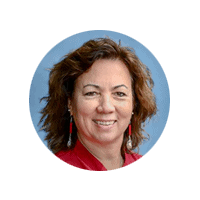by Darlene Fisher, EdD, Consultant/International Accreditation Leader, NEASC-CIE
Growth and transformation
Over the past two years I’ve worked with more than 25 schools taking on the challenges and growth of the NEASC: ACE Protocol. These schools are exploring ways of developing capacity within the community, and using this to engage with the 10 Learning Principles which are at the core of ACE Accreditation protocol. These Learning Principles have provided structures to guide growth and transformation in each case. Of course, with any growth comes the occasional growing pain! However, the very positive results visible through the process provide the impetus for continuing.
Three areas of particular interest in many schools working with the ACE Accreditation protocol include:
1. A significant focus on learning rather than teaching.
2. The review of assessment and how it can be used to support learning rather than simply measure a specific output.
3. The development of student agency and their responsibility for learning.
Quality learning: a change of focus
In every school, the comment is made in a number of ways, by different people and in different conversations: ‘We have never had these types of conversations before!’. ACE provides a structure for engaging learners in all stakeholder groups (i.e. students, teachers, leaders and parents) in discussion around the challenges of defining, engaging in, and evaluating quality learning. These conversations focus on the learning taking place in the classroom as a way of evaluating the quality of learning.
Rather than focusing on the teachers’ actions, the interest is in what the students are doing and learning, while engaged in the activities which are facilitated by the teachers. This provides a very positive energy and focus on increasing student engagement and agency while adding to their knowledge and skill levels.
Learning Principle 3: Assessment for, of and as learning
One of the frequent challenges that teachers raise when engaging with the ACE Learning Principle 3, is how to understand and implement ‘assessment as learning’ rather than just ‘of’ or ‘for’ learning. Moving a school’s understanding of assessment from teacher centred to student centred is a challenge but when you keep in mind that students can learn so much from their own and peer assessment, then why would we deprive them of these opportunities once we know its value?
How to engage all learners in assessment ‘as’ learning, is of course the challenge. Teachers may self-assess the success of their teaching through evaluating the engagement of the students. Students might listen to peer assessment or self-assess on criteria previously agreed as a group, and then use this information individually to clarify areas of strength and challenge and ways they might address them. Assessment as a process of learning is a challenge that each school needs to take on for its own community in its own context.
Learning Principle 5: Learner Agency
Another of the challenges community members speak of – is how to balance curriculum requirements, with the desire to increase students’ capacity for self-directed learning. These curriculum demands can be quite hefty in some national and international systems, but we need to remind ourselves that students learn more and better when they are engaged with their learning, rather than when they are mainly receptors of instruction, however well intentioned or inspiring. There is no easy answer but it is important to start exploring how to increase agency.
Even one small trial in a class is worth exploring over time and could provide benefits which include developing understanding and capacity, both by the student’s of their learning, and the teacher of their pedagogy. Thus a win-win is possible. Increased student achievement – however that is defined – is worthy of effort and thus there can be no excuse for not exploring ways to improve learning. Providing learners with the skills and competencies to use their ‘agency’ in positive ways, will provide rewards not only for their school life but for the future.
NEASC: ACE
The ACE Learning Principles and accreditation Protocol provide a structure and philosophy, and engage schools in focused work to build quality learning, and are committed to achieving the very best Impacts for their learners. Helping schools transform so they can focus on quality learning, use assessment to support learning and develop learners’ agency, are only a few of the areas of growth enabled through the ACE protocol. Join us at one of the information sessions so you can learn more about how this can help your learners and their achievements, for life!
[box] FariaPD supports teachers and leaders around the world with hands-on, active and creative professional development experiences. Join one of our online or in-person professional development events, each designed to support the unique goals of your school or district. FariaPD is part of Faria Education Group, an international education company that provides services and systems for schools around the world including ManageBac, a curriculum-first learning platform, OpenApply, an online admissions service, and Atlas, a tailored curriculum management solution for schools. [/box]

ABOUT THE AUTHOR
Prior to joining NEASC as a consultant and international accreditation leader, Darlene worked for 30+ years as a leader and teacher in day and boarding schools in Australia, USA, Oman, Thailand, India, Turkey, and the UK. She has experience with IB, the Australian, US and UK curricula in many culturally diverse school communities. Darlene has a Doctorate from the University of Bath, UK. The Thesis focused on international school leadership and how culture impacts what is effective leadership. She also holds a Masters degree from St. Andrews University, UK.
Darlene previously served as Chief Learning Officer at ECIS with responsibility for developing and presenting teacher and leader professional development with a particular focus on international education. She has also worked with teacher training for Cambridge (CIE), as well as mentoring heads of school and consulting on curricula and teacher development in schools across Asia, Middle East and Europe.
Over the past 6 years Darlene has been collaborating in a core team of four, on professional development for aspiring and experienced school leaders for the International Baccalaureate Organisation. The team have created ‘The Essentials of International Leadership’ and further PD for experienced heads of schools. In this process, her work includes curriculum design, workshop leader training and their ongoing management, as well as workshop facilitation and participant support throughout their leadership studies.

